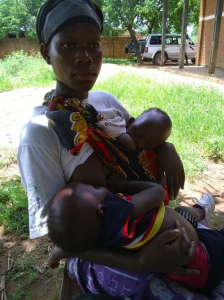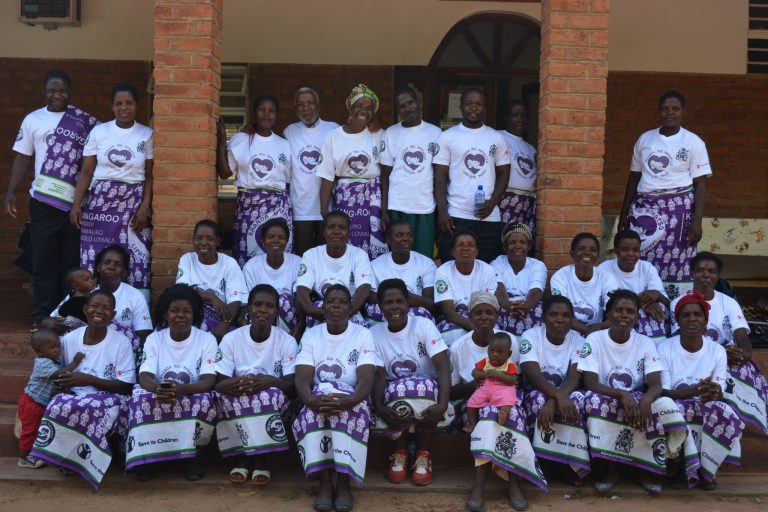A Social and Behavior Change Communication Campaign shifts community perception of newborn life in Malawi.
By Victoria Lwesha, Senior MCHN Technical Advisor at Save the Children Malawi
Featured image: Group Village Headman Saiti from Traditional Authority Chikweo Machinga delivers key messages on newborn life at a community campaign event
A preterm baby is among the most precious and vulnerable, requiring ongoing care, love and treatment to ensure their survival. Yet across Malawi, a country with the highest preterm birth rate in the world – 18 per 100 live births – small and sick babies have historically been undervalued and treated as less than human and therefore not worth saving.
A variety of cultural beliefs have led people to consider preterm or low-birth-weight babies as a result of witchcraft, a woman’s promiscuity or her weakness. Small and sick babies have been compared to little rats or cats. “In the past, we could not accept premature babies, they were not regarded as human beings/children. They were systematically eliminated from society,” said Group Village Headman Saiti from Traditional Authority Chikweo Machinga.
Because of these beliefs, many preterm babies have gone untreated and died from preventable conditions including asphyxia, sepsis, and infection. In fact, direct complications of preterm birth are the second leading cause of child deaths in Malawi and 14 newborns die each day.
With increased access to healthcare and ongoing efforts to improve the quality of care provided to newborns in health facilities, there is a critical need to address community attitudes toward the value of newborn life. In 2015 and 2016, the Saving Newborn Lives project developed and implemented a brief Social and Behavior Change Communication (SBCC) campaign in Thyolo and Machinga Districts. The campaign, called Khanda ndi Mphatso Lipatseni Mwayi (A Baby is a Gift, give it a chance), aims to improve newborn health by shifting norms around the value of newborns and promoting Kangaroo Mother Care (KMC) for preterm and low birth weight babies.
Community Action Groups (CAG) helped to develop key activities to address negative social norms through a multi-channel intervention including community shows, SMS messaging, a radio jingle and bill boards. Trained as campaign champions provided with messenger toolkits and detailed flip charts, CAG members, religious leaders and KMC veteran mothers organized community activities including drama sessions and community discussions to further engage community members with the key message that “every life is precious. No matter how small.”
After eight months of implementation, a report was produced detailing the process of developing the campaign from branding and messaging development to implementing the activities within targeted communities. Now in its second year, the campaign is undergoing a formal evaluation to better understand the impact of the intervention. At the same time, the shift in perception is already apparent just through communicating with community members. Saiti, the same headman in Machinga that once discussed how undervalued newborns were explained that “…we have learnt a lot, we are now raising them just like any other child. We have broken the taboo around them. It’s pleasing to see them growing up just like any other child.”

And this campaign hasn’t just led to changes in perceptions but in actual lives saved as mothers recall having heard religious leaders or radio spots talk about it or having been engaged in activities at community level, while dedicated providers helped them practice the techniques learned to support their babies. “We have twins that were born in June 2016 and they each weighed 1.2kg. Nurses counselled us to raise them the Kangaroo way. At first I didn’t understand this concept, but members of CAG visited and supported us. I worked hand-in-hand with my wife in raising our children. We both slept with the babies strapped on our chest. We were empowered to overcome stigma around premature babies and we are proud to have our babies alive and healthy,” says Frank George, community member from Lipagani village (GVH Saiti) in Machinga.
These examples provide anecdotal evidence that communities have started to value all babies as gifts, and are now providing the necessary support to ensure their survival. We hope that the systematic evaluation will show even more results in this direction.
At February’s launch of the Network for Improving Quality of Care for Maternal, Newborn and Child Health, we gave a presentation on the campaign and the importance of engaging communities in saving and valuing newborn lives. The event, organized by the Malawi Ministry of Health and the World Health Organization together with many partners including Save the Children, provided an opportunity to exchange technical knowledge and experiences in quality care for maternal and newborn health. Through presenting on the SBCC campaign in Malawi, we ensured that the effects of community engagement practices around newborn health were included in the conference discussion.
Improving the quality of care received by mothers and newborns is becoming an important topic in the global health community but unless community cultural norms are addressed through community engagement, newborns lives will continue to be lost.
